"My call sign used to be Vibrator, now it's Gentle." How are LGBT people treated in the Ukrainian military?

When Russia launched its war against Ukraine, people of different ages and with different faiths and worldviews took up arms. Many members of the LGBT community also joined the army.
Some were already in the army when they figured out their sexuality. Others knew that if Russia managed to take over Ukraine, being gay wouldn’t exactly be an asset.
Ukrainska Pravda Zhyttia (Life) spoke with LGBT military personnel currently serving in the Ukrainian army to find out how they are treated there.
Here we share three of their stories:
- Max, a lesbian – army clerk;
- Oleh, call sign Zhaba (Toad), a gay man – officer in a territorial defence brigade;
- Pavlo Lahoida, call sign Lahidnyi (Gentle), a gay man and LGBT activist – anti-aircraft gunner.
Max: "During my years of service I’ve learned how to respond to people"
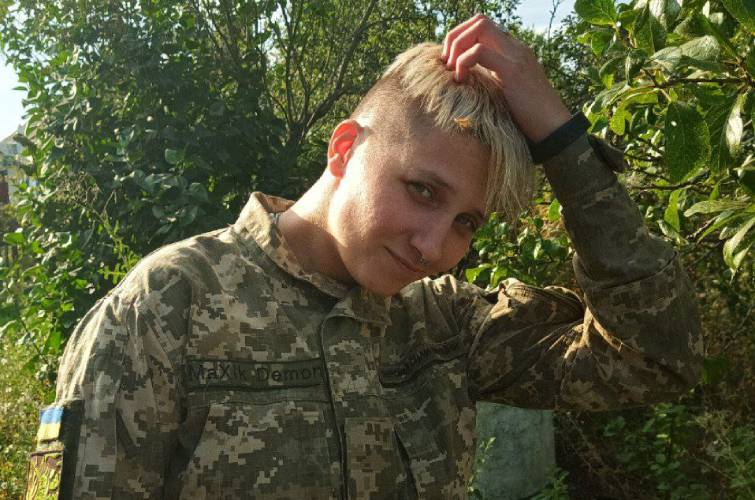
Max (originally Anhelina), 23, was born in Kamianets-Podilskyi in western Ukraine and grew up in a large family with four other siblings.
Max trained to be a painter and decorator, working on interiors, shop windows and buildings, though he wanted to don a military uniform from a young age.
Max came out as lesbian four years ago, after a year of military service.
Max – then still Anhelina – realised he liked women and started using he/him pronouns and a male name.
Max’s appearance changed, too: he cut his hair short and started wearing men’s clothes. He doesn’t want to change sex, though, and identifies as a lesbian.
"I was serving under contract in an artillery unit when I started using he/him pronouns and using Max as my social media name. Now it’s my call sign.
Most of my friends know me as Anhelina, so I let people choose: they can call me either, depending on how they see me," Max says.
He’s had mixed responses from his fellow soldiers.
"The guys call me Anhelina or Helik. When they ask me why I use he/him pronouns, I tell them because I’m Max – and then it’s this whole thing of ‘Wait, what? Max?’
One unit told me that on their territory I’m Anhelina and have to use she/her pronouns. I told them I’d never set foot there again," Max adds.

Max currently works as an army clerk, having graduated from the Poltava Military Institute and worked in military communications. Before Russia’s full-scale invasion, he was a military depot manager.
Max says that for the most part, people in the army stay out of each other’s personal lives: "You have two arms and two legs, so get on with your work" is the prevailing attitude.
Sometimes, though, things can be different.
"A fellow soldier once told me: ‘I know why you became a lesbian – it’s because you joined a battalion where you were the only woman among 600 guys, so you decided to draw boundaries.’ Or once when a female volunteer brought us some aid, someone said: ‘Anhelina, you should go and talk to her.’
If people ask me about my sexual orientation, I tell them I like girls, I’m a lesbian," Max continues.
Some of his fellow soldiers see Max’s sexuality as an illness.
Max says people used to tell him he’d "grow out of it" in three years, or in five. Now they tell him he’ll be over it in 10 years.
"I have an alright relationship with my commanding officer. When a psychologist came to our unit, he [the commanding officer] joked: ‘Go and talk to her, maybe she’ll set you right, and we’ll even get you a husband’," Max says.
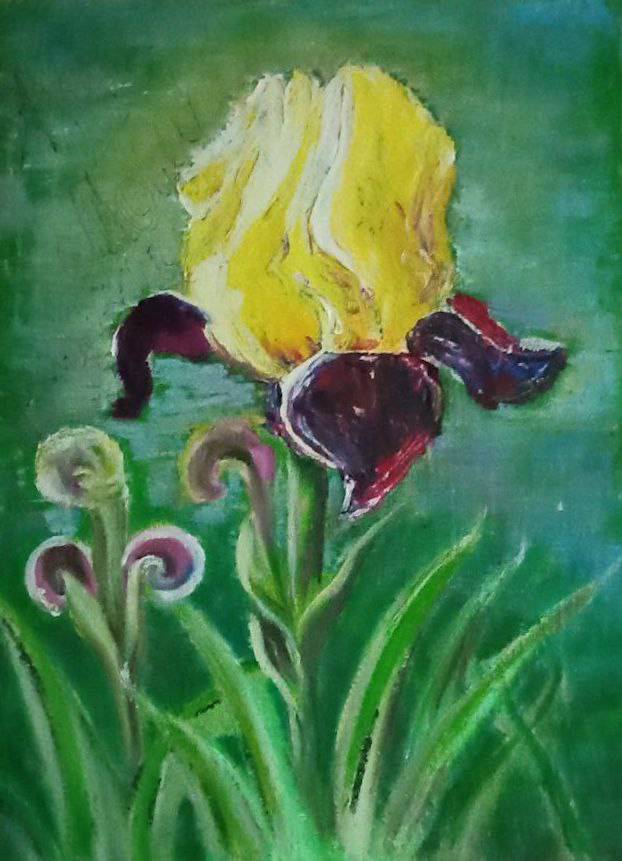
Max doesn’t have a partner at the moment. His last relationship ended in June.
There is a woman he likes. It’s mutual, but she is a civilian and lives a long way away from where Max is currently based, and neither of them has dared to initiate a relationship.
"When my fellow soldiers tell me that I just ‘haven’t met the right guy yet’, I tell them that they probably haven’t either, since they’re not into homosexuality.
I think that during my years of service I’ve learned how to respond to people so that I’m not picked on," Max explains.
In the future, he hopes to continue working in the military – and dreams of starting a family.
Max says that when the bill on same-sex partnerships is passed in Ukraine, he’ll get married, get a dog, and have two children.
Oleh: "I love it when people ask: Why did you choose to become gay?"
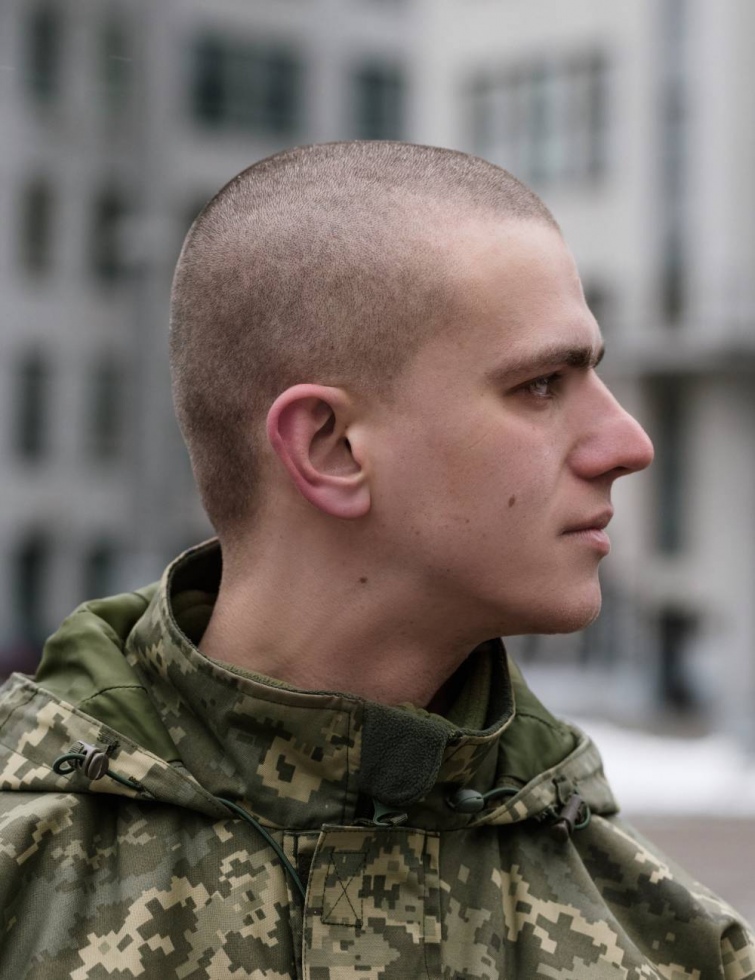
Oleh – call sign Zhaba (Toad) – is an officer in a territorial defence brigade.
He joined the army on 28 February 2022. It took him three attempts: he had no experience with weapons.
Oleh’s father, who used to serve in the border forces, joined the Armed Forces of Ukraine too.
Oleh studied to be a lawyer but has never worked as one. Before Russia’s full-scale invasion, he worked as a sommelier. He loved cycling and volunteered in an animal shelter.
Oleh recalls talking to his friends and family about his plans when war was already in the air, in early February 2022.
"I told everyone hundreds of times that I’d never go and fight, I’d wait it out somewhere outside of Kyiv, in a cellar in some village. But when 24 February happened, I took one look at my mum – she was terrified and in tears – and changed my mind.
Given Russia’s homophobic policies, I figured that if Russia managed to take over Ukraine, being gay wouldn’t exactly be an asset," Oleh says.
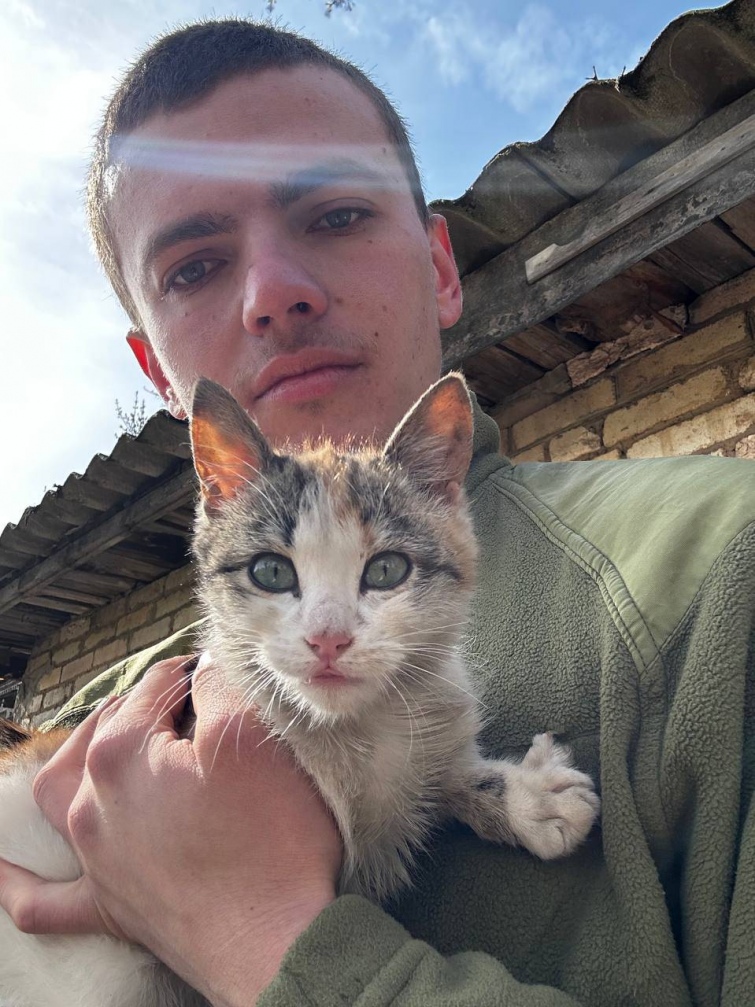
Oleh was a teenager when he realised he was gay. He said he felt attracted to boys from an even younger age, but for a long time he pushed his thoughts about homosexuality away.
"Until I was 16 I thought it wasn’t okay, it wasn’t normal. I desperately tried to date girls and to like them.
But when I was 16, I met a guy online and went on a date with him. After that I thought: if I’m gay, so be it," Oleh says.
Oleh told his closest family and friends he was gay two years later. He came out on social media soon after the start of Russia’s full-scale invasion.
"I did it several days after starting military service, because I wanted to make my activist position clear while all my friends were in a race to get to [the relative safety of] Zakarpattia [in western Ukraine]," Oleh explains.
He fought in Kyiv Oblast and witnessed its liberation.
Afterwards, his unit was based in Kyiv. In September 2022, however, he left the Kyiv unit and joined a battalion in Kharkiv. He has since been serving in eastern Ukraine.
"I tell people [I’m gay] when I think they’ll react well. Whenever I’m asked if I have a wife or a girlfriend, I almost always say I’m gay. I love it when people ask: Why did you choose to become gay?
When I tell someone I had a boyfriend, most people respond along the lines of: ‘Wow, a real gay man, can I touch you?’" Oleh adds, smiling.
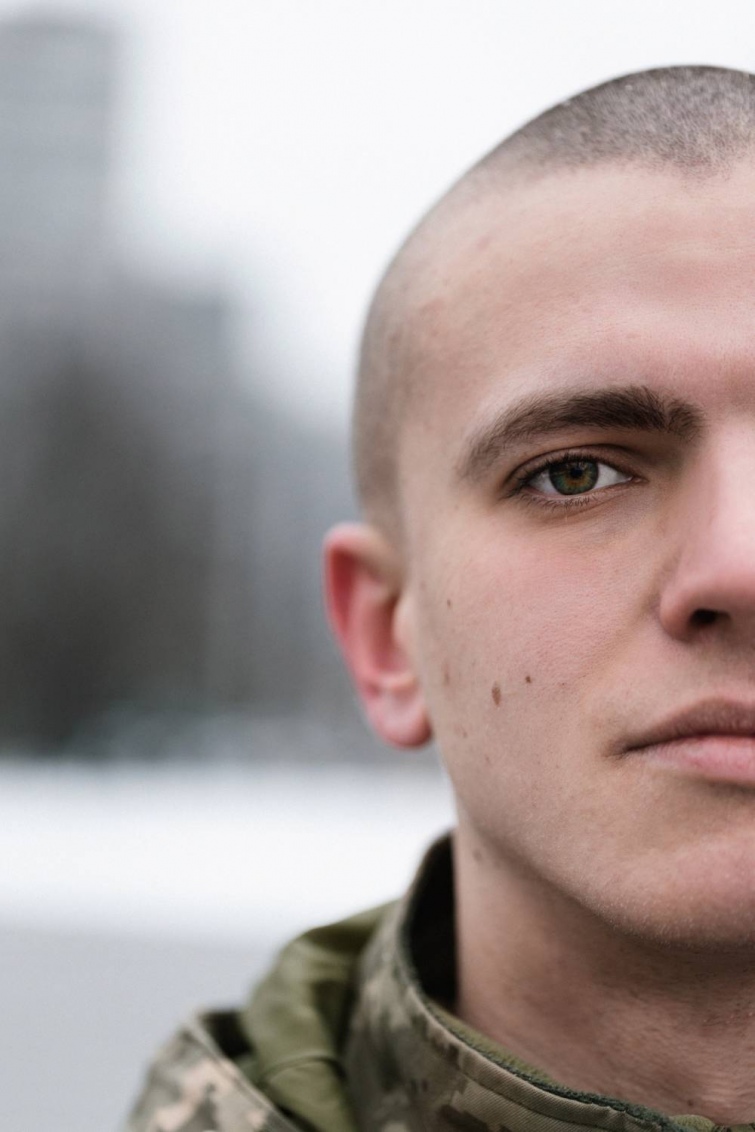
Some of his fellow soldiers distance themselves from Oleh after finding out he’s gay, but mostly people treat him the same.
Oleh is the youngest soldier in his unit.
"Some people say: ‘Nonsense, you’ll grow out of it.’ Others are convinced it’s a phase. One man told me: ‘When I was 16, I also thought I liked guys for about two days. Then I met Natalia and realised I was wrong’," Oleh shares.
He pours out his feelings and worries into his diary. He says it helps him keep his mental health in check.
Oleh also talks his issues through with a therapist and shares his worries and feelings with a female friend who is also serving in the Ukrainian military.
"There’s no need to discuss private matters with my fellow soldiers, and besides I don’t like letting people in on my soft spots," Oleh adds.
Oleh has met many LGBT members of the military on the front line, particularly gay men.
He is certain that the more LGBT personnel there are in the army, the faster public attitudes will shift, and the more tolerant people will become.
Pavlo: "Gentle here, over"
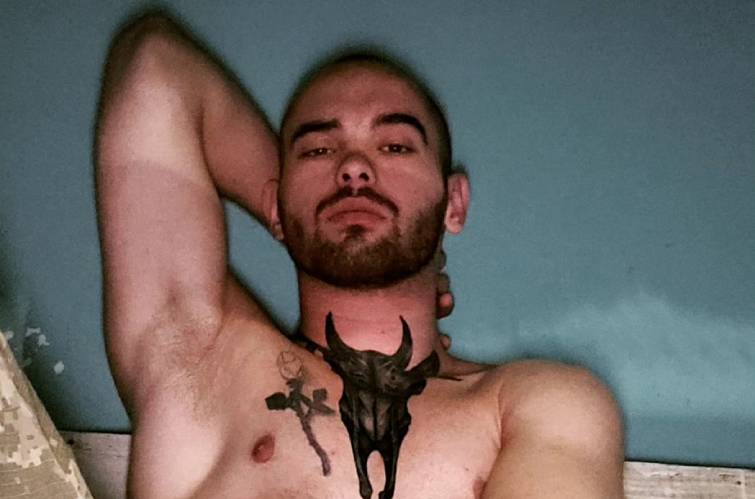
For the past five months, anti-aircraft gunner Pavlo Lahoida, 21, has had the call sign Lahidnyi (Gentle).
He says the name mostly fits his disposition, though not always.
Gentle is his second call sign.
"When I first entered the battlefield as part of an artillery unit after completing my mandatory service, I was shaking with nerves. A commander who was in the trench with me said: ‘From now on, your call sign will be Vibrator.’
But it didn’t stick. Now people have a different name for me. On the radio I’ll hear ‘Gentle? Over,’ and reply ‘Go ahead. Gentle here, over’," Pavlo says.
When Russia’s full-scale invasion started, Pavlo had two months of his mandatory service left. He volunteered to go to the front.
Pavlo trained to be a house painter but has never worked as one. After graduating, he and his best friend got interested in LGBT activism, an issue then close to his heart. Pavlo was 13 when he realised he was gay.
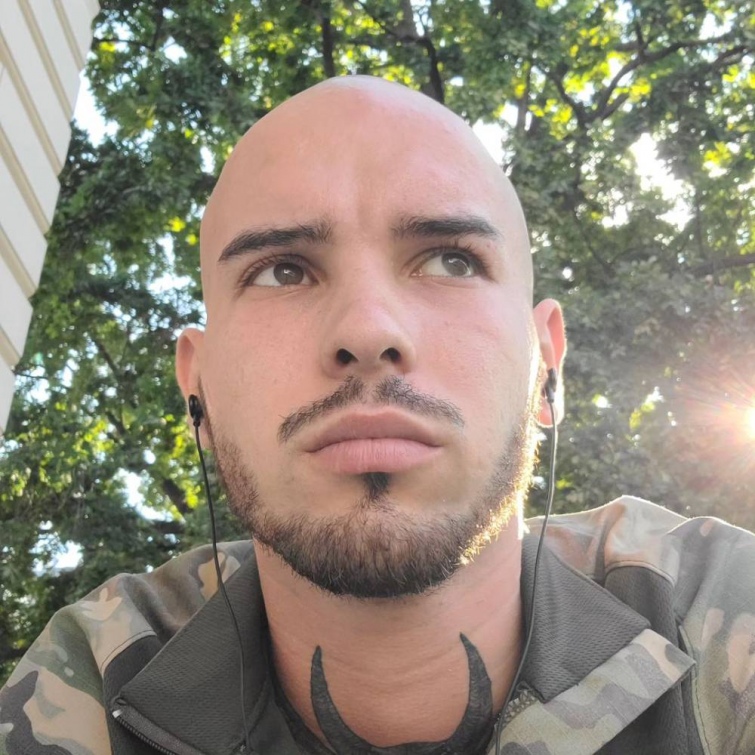
"I felt something very strange happening to me. I was scared and couldn’t figure out why I liked boys. I tried to date a girl, but only because I was trying to suppress my attraction to boys," Pavlo says.
He doesn’t hide his sexual orientation in the military, but doesn’t volunteer information about it unless he’s asked.
The first person in the military Pavlo told he was gay was another guy who was doing his mandatory service.
He was surprised, but made Pavlo feel that he thought it was okay to be gay.
"I was testing the waters to see how people in the military would react. Sometimes I’d start talking about the LGBT community to figure out where people stand on that.
People have responded to my confession in different ways: with aggression, bullying, acceptance, and compassion," Pavlo shares.
He recalls an incident that happened in Mykolaiv Oblast, where his unit was based at an industrial plant.
"A man holding a metal skewer in his hands approached me, sat next to me, and started telling me about his time in prison. I thought he was going to kill me, or if not, that this conversation couldn’t end well. My gun was out of reach.
He got up and started hitting me with that skewer on my head and body – this happened in the summer, I was only wearing a vest. I was praying that he wouldn’t stick the skewer into me. After a while he just left," Pavlo recalls.
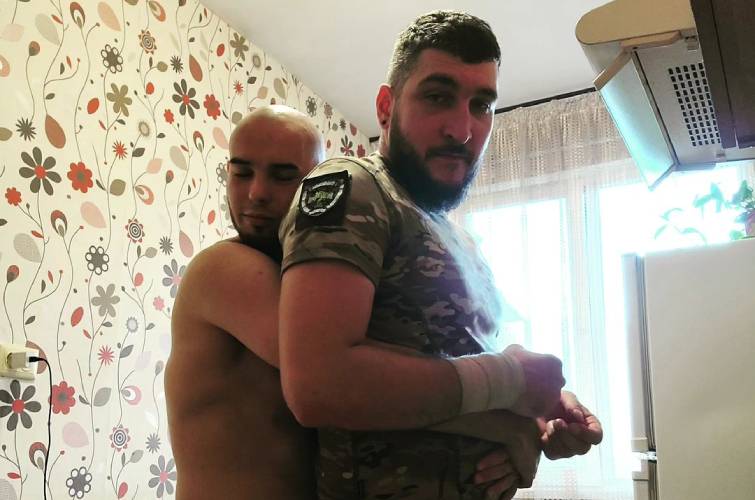
Jokes about homosexuality are quite common among the military. They vary in how funny they are, but Pavlo says it’d be tough in the army without a bit of self-irony.
Sometimes he’s the one making jokes.
"Sometimes when one of the guys is getting changed I tell them: ‘Please turn your back to the wall, I might not be able to control myself’," Pavlo says.
Pavlo’s homosexuality has strained his relationship with the commander of the unit where he’s served for the past two years.
"The first time we fought was when he started behaving aggressively towards me and badmouthing my mum and my dad, who’s dead; I hit him. He transferred me to another unit after that fight, but then brought me back. We had another fight," Pavlo says. "Our poor relationship is the reason why I’ve only had seven or eight days off in the last two years."
Pavlo now plans to transfer to another unit, this one based in Volyn Oblast in northwestern Ukraine. That’s the unit his boyfriend Vlad serves in.
Pavlo has suffered eight concussions during his service. He says war is now part of his life and he can’t imagine not being in the military.
He’s hoping to sign a contract with the army after the war ends, to continue his service and get promoted to an officer rank.
Pavlo and Vlad share plans for a future together and are hoping to open an LGBT night club in Kyiv, the largest one yet.
"If Vlad and I both survive [the war], we’ll put together an archive film with photos and video footage documenting what each of us has been through. It would be great to formally tie the knot. I think if the bill on civil partnerships isn’t approved during martial law, when the war is over, no one is going to care about us or about the LGBT community’s issues," Pavlo says.
Anastasiia Poia, Ukrainska Pravda Zhyttia (Life)
Translation: Olya Loza
Editing: Teresa Pearce
